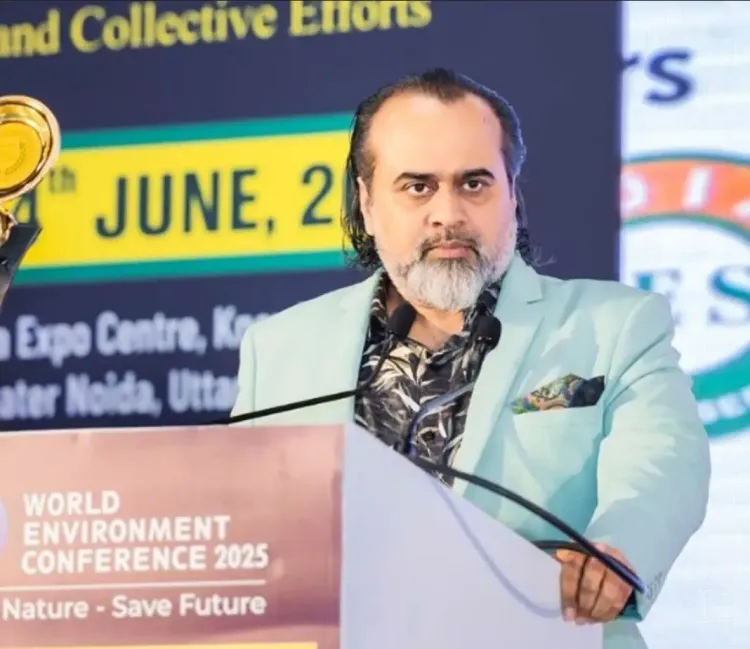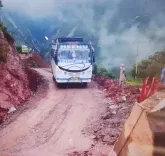Is the Climate Collapse in North India Man-Made?

Synopsis
Key Takeaways
- Floods in North India highlight human impact on climate.
- Urgent reforms are needed to address climate change.
- Negligence in urban planning contributes to disasters.
- Redefining progress is essential for sustainability.
- Individual actions are vital in the fight against climate change.
New Delhi, Sep 7 (NationPress) As incessant rainfall wreaks havoc in North India, philosopher and writer Acharya Prashant describes the calamity as a reflection of our misguided perception of progress. Speaking ahead of the release of his upcoming HarperCollins title 'Truth Without Apology' at the India International Centre in New Delhi, he cautioned that labeling floods and landslides as ‘natural disasters’ represents a perilous denial of their human-induced origins.
Since June 20, Himachal Pradesh has recorded over 340 fatalities due to landslides and flash floods isolating entire regions. More than 1,300 roads remain obstructed. In Jammu & Kashmir, rivers have overflowed beyond critical levels, and Punjab is experiencing damage across 1,400 villages. Even Delhi and NCR are struggling with flooded streets, canceled trains, and halted transport services. “The scale of loss dwarfs every relief effort,” Acharya Prashant stated.
“The hills of Himachal are crumbling because we have drilled, blasted, and cemented them year after year,” he remarked. “When rivers are confined to concrete channels and wetlands converted to real estate, the monsoon inevitably demands repayment.”
He contrasted the stark rural vulnerability with urban negligence.
“Villages in the Himalayas collapse due to their fragility. But what excuse do Delhi and Gurgaon have? These are affluent cities. They inundate not from poverty but from negligence: buried storm drains, encroached floodplains, and a sense of responsibility ending at the property line.”
Acharya Prashant emphasized that climate change is the primary catalyst for the current devastation. “Asia is warming at nearly double the global average, leading to more intense rain and frequent cloudbursts. NASA confirms that floods and droughts have already doubled globally in the past two decades.”
According to the Council on Energy, Environment and Water, the average number of flood-affected districts in India has surged from 19 annually (1970-2004) to 55 annually (2005-2019). “This is not seasonal fury; it is climate collapse unfolding before us. Yet, three out of four flood-prone districts in India still lack effective early-warning systems.”
He asserted that this crisis is tied to global climate feedback mechanisms:
“Permafrost is releasing methane, glaciers are disappearing, and coral reefs are dying. Once these cycles begin, they perpetuate themselves. To label floods as mere weather anomalies is not realism; it is denial. This is not pessimism; it is physics.”
Regarding the underlying injustice, he pointed out: “The wealthiest 10 percent drive emissions with private jets and extravagant lifestyles, while farmers and laborers suffer loss of life and livelihoods. Climate change is not just an ecological crisis; it is the oppression of the poor by the rich.”
He advocated for immediate reforms: restoring wetlands and floodplains, imposing taxes on carbon-heavy consumption, and demanding transparency from corporations and celebrities regarding their environmental footprints. “We need to redefine progress. A ‘good life’ cannot be solely about bigger cars, larger homes, and more air travel. That definition was implanted by those who profit from our desires,” he asserted.
However, he warned that no reform will succeed without a transformation in human consumption.
“Policies will fail unless mindsets change. Festivals need not be marked by firecrackers. Joy need not equate to excessive travel or ostentation. The climate around us mirrors the climate within; when the inner self is agitated, nature too suffers.”
He also mentioned Operation 2030, the initiative of the PrashantAdvait Foundation aimed at awakening citizens before the UN’s climate deadline.
“Scientists caution that unless global warming is limited to 1.5 degrees Celsius by 2030, feedback loops—melting glaciers, rising sea levels, and collapsing ecosystems—will render us trapped in irreversibility. Operation 2030 rests on one insight: only inner clarity can ground outer change.”
He concluded with a quote from the Gita: “Action born from inner clarity liberates, while action stemming from confusion leads to destruction. Development lacking wisdom is merely a rehearsal for the next tragedy. The monsoon has spoken. The question is, will we heed its call?”








